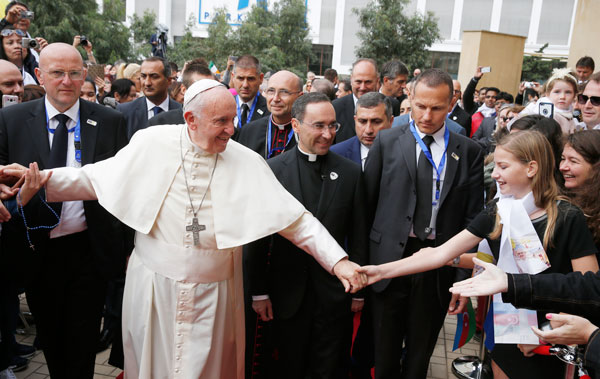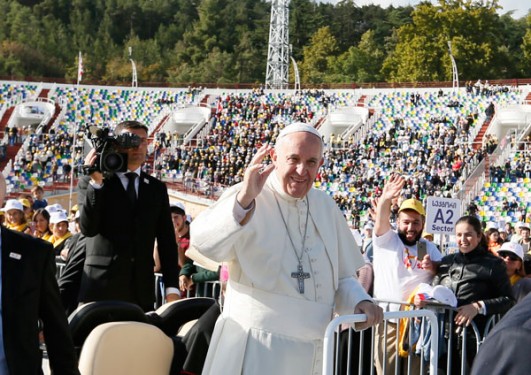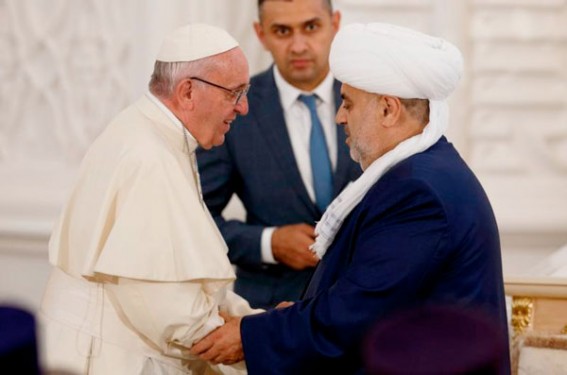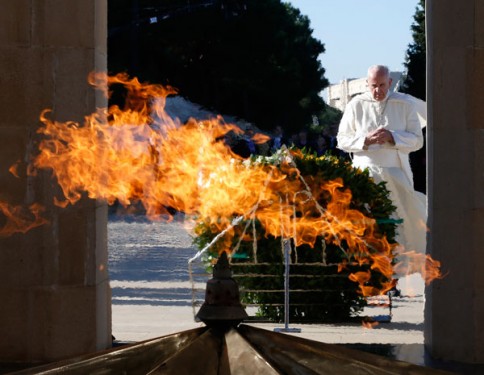
By Cindy Wooden
BAKU, Azerbaijan (CNS) – Cooperation, peace and prosperity come when people know how to hold fast to their cultural and religious identities without ever denigrating or trying to deny the rights and identities of others, Pope Francis said.
Twenty-five years after Azerbaijan, a predominantly Shiite Muslim nation, proclaimed its independence from the Soviet Union, the pope said strong civic institutions and lasting economic growth would come only when attention is paid to the poorest sectors of society and only as long as the nation’s multicultural identity is seen as a national treasure.
Pope Francis met with President Ilham Aliyev, government officials, representatives of civic institutions and members of the diplomatic corps in Baku Oct. 2, the final day of a three-day trip that began in Georgia.
Aliyev said that although the Soviets closed or destroyed many mosques, churches and synagogues, the nation’s people have always coexisted in peace.
The Vatican initially had framed the trip as a three-nation visit to the Caucasus region, but a sudden outbreak of violence in the contested territory of Nagorno-Karabakh in April led to a decision to do the visit in two stages. Pope Francis went to Armenia in June.
While the majority of people in Nagorno-Karabakh are ethnically Armenian, Joseph Stalin made the territory part of Azerbaijan in 1921. Since 1988, Armenia and Azerbaijan have had an undeclared war over the territory; some 30,000 people have died in the fighting and even more people have been displaced.
Aliyev told the pope the conflict must be resolved through the application of international law and he insisted Armenia is violating that law by stationing troops in the enclave.

Persevere Wisely, Courageously
In relations between states, the pope told the political and civic leaders, “it is necessary to persevere wisely and courageously on the path which leads to authentic progress and the freedom of peoples, opening up new avenues that lead to lasting agreements and peace. In this way, peoples will be spared grave suffering and painful wounds, which are difficult to heal.”
Pope Francis expressed his “heartfelt closeness to those who have had to leave their land and to the many people who suffer the effects of bloody conflicts,” and said he hoped the international community would find a way to help resolve the dispute.
As he did in Armenia in June, the pope urged “everyone to grasp every opportunity to reach a satisfactory solution.”
Creating a harmonious society made up of people coming from different ethnic, cultural and religious groups is an essential task today, Pope Francis said. People need to demonstrate “that it is possible to bear witness to one’s own ideas and worldview without abusing the rights of others who have different ideas and perspectives.”
Political and religious leaders, he said, “must exclude attitudes and approaches which instrumentalize their own convictions, their own identity or the name of God in order to legitimize subjugation and supremacy.”

Willingness for Dialogue
“The world, unfortunately, is experiencing the tragedy of many conflicts fuelled by intolerance, which in turn is fomented by violent ideologies and by the effective denial of the rights of the weakest,” the pope said. The only valid path to combat such “dangerous deviations” is to foster “an untiring willingness for dialogue.”
On the first leg of his journey, Pope Francis stressed unity among Christians.
In Tbilisi, Georgia, he paid honor to the steadfast faith of Orthodox Christians. He urged them to draw closer to other Christians and work together to share the Gospel.
Georgian Orthodox Patriarch Ilia II, who recently has been cautious in his relations with leaders of other churches, greeted Pope Francis when he arrived at the Tbilisi airport Sept. 30, welcomed him to the patriarchal palace that evening and hosted him again Oct. 1 at Svetitskhoveli Cathedral in Mtskheta.
Walking into a meeting hall at the patriarchate Sept. 30, Pope Francis helped the 83-year-old Patriarch Ilia, who moves with great difficulty because of Parkinson’s disease.
More than 80 percent of Georgians are Orthodox; Catholics from the Latin, Armenian and Chaldean churches form about two percent of the population.
In the 1980s, the Georgian Orthodox Church was deeply involved in the process of seeking Christian unity, but its participation has waned in recent years in conjunction with a stronger assertion of Georgian identity, including its language and Orthodox faith.
When the pope arrived in Georgia, small groups of Orthodox faithful gathered on the road outside Tbilisi airport holding signs protesting the his visit. One sign called him a “heretic” and the other accused the Catholic Church of “spiritual aggression.” The same groups were present the next evening outside Svetitskhoveli Cathedral, the spiritual center of the Georgian Orthodox Church.
The Orthodox groups most opposed to dialogue with Western Christians have expressed fear that closer ties with the West will lead to what they see as moral decadence.
Patriarch Ilia told Pope Francis Sept. 30 that while globalization is not “a negative phenomenon per se, it contains a lot of dangers and threats,” including the possibility of creating what he described as a “homogenous mess” that erases specific cultural and moral values.

Spiritual Regression
While the world has experienced progress in many ways, he said, “humanity has taken steps backward in spirituality, in belief in God.”
Nevertheless, the patriarch spoke warmly of Catholic-Orthodox dialogue and practical cooperation and he welcomed the pope, saying, “This is truly a historic visit. May God bless our two churches.”
Pope Francis began his speech Sept. 30 by making a personal, improvised comment: “I am profoundly moved by hearing the ‘Ave Maria’ composed by Your Holiness. Only a heart profoundly devoted to the Mother of God could compose something so beautiful.”
“Faced with a world thirsting for mercy, unity and peace,” Pope Francis told the patriarch and members of the Georgian Synod of Bishops, God asks Catholics and Orthodox to “renew our commitment to the bonds which exist between us, of which our kiss of peace and our fraternal embrace are already an eloquent sign.”
While the Georgian patriarchate traces its origins to the preaching of the apostle Andrew, the church of Rome – the papacy – was founded by the apostle Peter. The two apostles were brothers, Pope Francis noted, and the churches they founded “are given the grace to renew today, in the name of Christ and to his glory, the beauty of apostolic fraternity.”
“Dear brother,” the pope told the patriarch, “let us allow the Lord Jesus to look upon us anew, let us once again experience the attraction of His call to leave everything that prevents us from proclaiming together His presence.”
“The Lord has given this love to us, so that we can love each other as He has loved us,” Pope Francis said.
